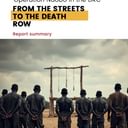
On August 18, 2023, a military judge in Guantanamo Bay overseeing the pretrial capital prosecution of Abd al-Rahim al-Nashiri, the Saudi national accused of organizing the October 2000 bombing of the U.S.S. Cole, excluded Mr. al-Nishiri’s confessions as the product of torture. “Exclusion of such evidence is not without societal costs,” said the judge, Col. Lanny J. Acosta Jr., in a 50-page decision. “However, permitting the admission of evidence obtained by or derived from torture by the same government that seeks to prosecute and execute the accused may have even greater societal costs.” This decision raises serious questions about the admissibility of confessions made under similar circumstances by the five detainees accused of the 9/11 terror attacks and may affect the plea negotiations currently underway for these men.
Mr. al-Nishiri was waterboarded and subjected to other forms of torture for four years while in C.I.A. custody through a program of “enhanced interrogation.” The issue at the recent hearing was about the admissibility of confessions he allegedly made in early 2007, after the violent interrogations ended. The prosecution argued that his confessions at that time were voluntary and admissible. But the judge disagreed, finding that “If there was ever a case where the circumstances of an accused’s prior statements impacted his ability to make a later voluntary statement, this is such a case. Even if the 2007 statements were not obtained by torture or cruel, inhuman, and degrading treatment, they were derived from it.”
Judge Acosta’s ruling came at the close of a three-week pre-trial hearing which featured a re-enactment of an interrogation scene endured by Mr. al-Nishiri, and details of techniques used against him including waterboarding, sleep deprivation, physical abuse, and the use of cramped confinement boxes for hours at a time.
Defense lawyers have long argued that the torture and trauma endured during years-long interrogations at CIA black sites and again in Guantanamo have caused permanent damage to their clients and should make them ineligible for the death penalty. The Pentagon and the FBI recently advised many of the family members of 9/11 victims by letter that plea negotiations could “remove the possibility of the death sentence.” In October, 2021, seven of eight members of a military commissions jury urged clemency for Majid Khan, an alleged Al-Qaeda courier, after hearing details about his years of torture by C.I.A. agents and operatives.
Carol Rosenberg, Judge Throws Out Confession of Bombing Suspect as Derived from Torture, The New York Times, August 18, 2023; Carol Rosenberg, Ex‑C.I.A. Psychologist Re-enacts Interrogation Techniques for Guantánamo Court, The New York Times, April 13, 2023; Ellen Knickmeyer and Jennifer Peltz, Plea Negotiations Could Mean No 9/11 Defendants Face the Death Penalty, the US Tells Families, Associated Press, August 16, 2023; Carol Rosenberg, U.S. Military Jury Condemns Terrorist’s Torture and Urges Clemency, The New York Times, October 31, 2021.


